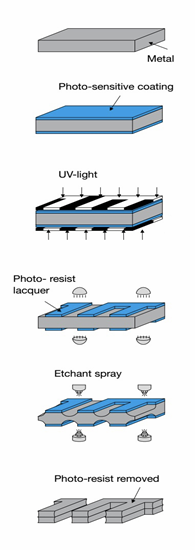What is Chemical Etching Process? The Chemical Etching Process Explained.
Feb 6, 2018 7:00:00 AM By Hua FanChemical Etching process can be concluded in a series of steps including Cleaning, Laminating, Exposing, Developing, Etching, and Stripping, after which rigorous inspection is automatically carried out on all components.

What is Chemical Etching Process? A 3D video tour through the whole process
See below a 3D animated video of the Chemical Etching process. To learn more about detailed process of Chemical Etching, download the Whitepaper Chemical Etching here.
What is Chemical Etching Process? A step-by-step Explanation
(1) Cleaning
The material is cleaned to remove all surface contamination. This provides a suitable surface for resist adhesion later in the process.
(2) Laminating
The cleaned metal 'blank' is then coated with a light-sensitive photoresist in a Class 6 clean room.

(3) Exposing
The metal sheet is then exposed to ultra violet light, which hardens the photoresist.
We use the LDI (Laser Direct Imaging) technology which is far more accurate than traditional photo tooling. The LDI Imager is capable of projecting high resolution images directly from a CAD file. In this way photo masks become redundant, which significantly reduces costs and decreases lead time.
(4) Developing
Unexposed areas are developed away, leaving bare metal.
(5) Etching
Etching solution is sprayed on both sides of the metal at high pressure. This accurately removes the unwanted metal.
(6) Stripping
The resist is removed in the end to leave behind burr and stress free components.
To know more about the Chemical Etching technology, feel free to talk to one of our engineers, or download our free Whitepaper Chemical Etching.

